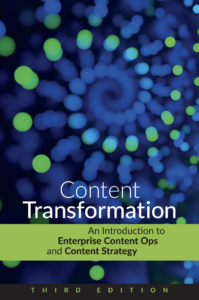Liberated type
(or should that be “Liberated typoes?”)
We have opened up free access to two of our white papers:
- Hacking the DITA Open Toolkit, available in HTML or PDF (435 KB, 19 pages)
- FrameMaker 8 and DITA Technical Reference, available in PDF (5 MB, 55 pages)
These used to be paid downloads.
Why the change of heart? Most of our business is consulting. To get consulting, we have to show competence. These white papers are one way to demonstrate our technical expertise.
(By this logic, our webcasts should also be free, but I’m not ready to go there. Why? We have fixed costs associated with the webcast hosting platform. Plus, once we schedule a webcast, we have to deliver it at the scheduled time, even if we’d rather be doing paying work. By contrast, we can squeeze in white paper development at our convenience.)
What are your thoughts? We are obviously not the only organization dealing with this issue…



Julio Vazquez
Interesting question. Consulting practically parallels English in that there are many exceptions to the “rules” and it’s hard to keep them straight.
I guess the yardstick I tend to use is whether the information I’m imparting is generally available. If I’m giving someone information on DITA, for example, has the topic already been discussed to death on the Yahoo! DITA User’s Group? Is the information so basic that it really would not benefit me to hold it close to the vest? If there’s minimal value to what I’m asked about or if what I’m writing about just condenses something already in existence then it should be free (or close to it). However, if I prepare a compendium of information with additional information to clarify concepts or usage models, then I should consider charging.
When I leave the realm of generalities, that’s when I start looking at the value and what I should charge for the knowledge. General information about information architecture I tend to give away. A specific implementation or the details on how I make decisions when designing and architecture is where you start getting into the value of the intellectual property and you need compensation for the effort you put into distilling the concepts into actions or action plans.
Of course, I’ve been called mad before so this may not really make you any more comfortable with my suggestions.
Sarah O'Keefe
Julio, I think the approach you are describing is what led us to have both free and fee-based white papers. I have come around to the idea that the value of making the information available (and thus helping our brand) exceeds the value of the revenue we get from a smaller number of people paying for the content.
The fact that the vast majority of our income is derived from consulting and training and not from books or white papers makes this approach a little more palatable.
(edited to add) Also, we rarely give away paper copies. The free stuff is all digital…